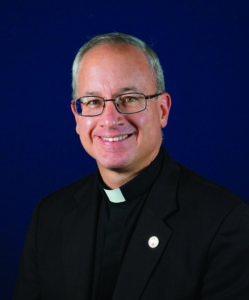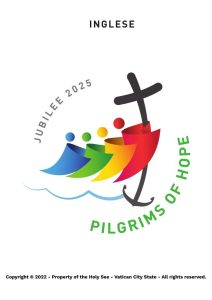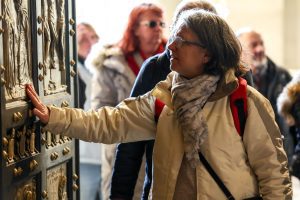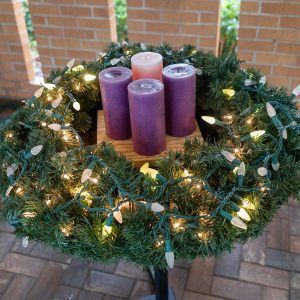“At the conclusion of Her earthly life, the Mother of Christ was raised in soul and body to Heaven, that is, in the glory of eternal life, in the full communion with God,” said Pope Francis when describing why on Aug. 15 the Church celebrates one of the most important feasts dedicated to the Blessed Virgin Mary: the Solemnity of Her Assumption.
The Catechism of the Catholic Church describes the Assumption as follows: “The Most Blessed Virgin Mary, when the course of her earthly life was completed, was taken up body and soul into the glory of heaven, where she already shares in the glory of her Son’s Resurrection, anticipating the resurrection of all members of his Body” (CCC 974).
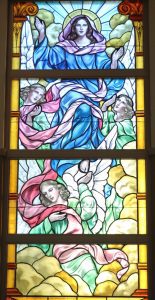
Bishop Frank J. Dewane stated, “Since death and the corruption of the human body is a consequence of sin, it would not be right that the Virgin Mary – who is free from sin – should be affected by this natural law. It is a privilege granted to Mary, as the Mother of Jesus.”
The Solemnity of the Assumption of the Blessed Virgin Mary is a Holy Day of Obligation. According to Church doctrine, Holy Days of Obligation are feast days on which Catholics are required to attend Mass and to avoid (to the extent that they are able) servile work.
In celebration of this important Solemnity, Parishes throughout the Diocese of Venice offer additional Masses to allow the faithful to participate in this Holy Day of Obligation. In addition, Diocesan Catholic Schools also celebrate school-wide Masses.
Pope Francis said that “Mary’s Assumption is a great mystery that concerns each one of us; it concerns our future. Mary precedes us on the way in which all those go, through baptism, have bound their life to Jesus, as Mary bound her life to Him. (This) Feast pre-announces the ‘new heavens and the new earth,’ with the risen Christ’s victory over death and the definitive defeat of the Evil One.”
Pope Leo XIV is scheduled to celebrate the Mass of the Solemnity at the Pontifical Parish of St. Thomas of Villanova at Castel Gandolfo. This is a return to the Papal tradition of hosting a public celebration of Mass of the Solemnity. Pope Francis only did so in 2013 at Castel Gandolfo, and in 2014 during an apostolic journey to South Korea. Pope Benedict XVI celebrated the Solemnity every Aug. 15 at Castel Gandolfo.
This Solemnity of the Assumption of the Blessed Virgin Mary is the oldest celebration of Our Lady. The original celebration, known as the “Memory of Mary” or “Falling Asleep of Mary” initially centered on the end of her earthly existence, and is commonly known as her “dormition.”
Soon the name was changed to the “Assumption of Mary,” since there was much more to the feast than the end of her earthly life. The belief that Mary had been taken up, body and soul, into heaven dates back to the Apostles themselves.
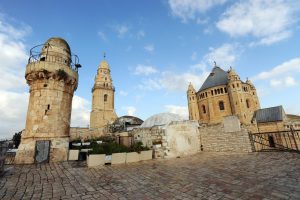
Clear from the beginning was that there were no relics of Mary to be venerated, and that an empty tomb stood on the edge of Jerusalem near the site of the end of her earthly existence or dormition. That location also soon became a place of pilgrimage. (Today, the Benedictine Abbey of the Dormition of Mary stands on the spot.)
In 1950, Pope Pius XII proclaimed the Assumption of Mary a dogma of the Catholic Church, therefore, an ancient belief became Catholic Doctrine and the Assumption was declared a truth revealed by God.
The declaration of the dogma was to “make our belief in our own resurrection stronger and render it more effective,” Pope Pius XII stated in a proclamation.
The proclamation went on to say that the definition of the Assumption “will contribute in no small way to the advantage of human society, since it (reflects and builds up) the glory of the Most Blessed Trinity, to which the Blessed Mother of God is bound by such singular bonds.”
It was also expected that the faithful would be called to a stronger piety toward their heavenly Mother and that those who meditate upon the glorious example Mary offers, be more convinced of the value of a human life entirely devoted to carrying out the heavenly Father’s will and to bringing good to others.
All the feast days of Mary mark the great mysteries of her life and her part in the work of redemption. The central mystery of her life and person is her divine motherhood, celebrated both at Christmas and a week later (Jan. 1) on the Solemnity of Mary, Mother of God. The Immaculate Conception (Dec. 8) marks the preparation for that motherhood, so that she had the fullness of grace from the first moment of her existence, completely untouched by sin. The Assumption completes God’s work in her since it was not fitting that the flesh that had given life to God himself should ever undergo corruption.
Prayer for the Feast of the Assumption
Almighty God,
You gave a humble Virgin the privilege of being mother of your Son,
and crowned her with the glory of heaven.
May the prayers of the Virgin Mary bring us to the salvation of Christ
and raise us up to eternal life.
We ask this though our Lord Jesus Christ your Son
who lives and reigns with you in the Holy Spirit,
one God, forever and ever,
Amen.






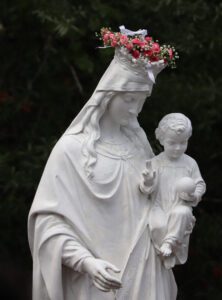

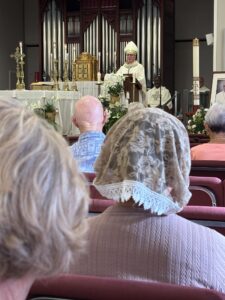
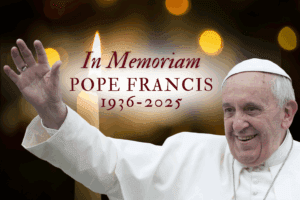 Subsequently, Parishes throughout the region have followed suit with many of the Masses in honor of Pope Francis, first the Masses of the Day within the Octave of Easter with the repose of the soul of Pope Francis as the intention. Following the Octave of Easter Parishes followed the Mass for the Dead, where the celebrating priests wore red vestments and prayer intentions were for the repose of the soul of Pope Francis.
Subsequently, Parishes throughout the region have followed suit with many of the Masses in honor of Pope Francis, first the Masses of the Day within the Octave of Easter with the repose of the soul of Pope Francis as the intention. Following the Octave of Easter Parishes followed the Mass for the Dead, where the celebrating priests wore red vestments and prayer intentions were for the repose of the soul of Pope Francis.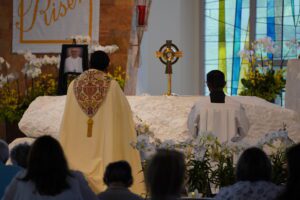
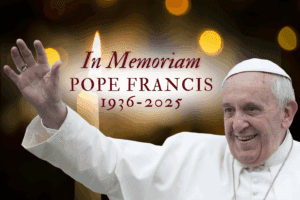
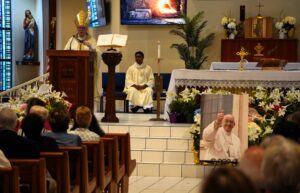
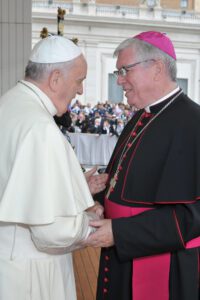
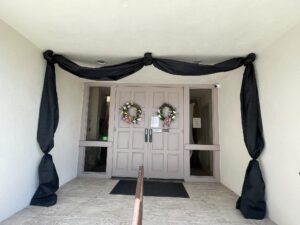
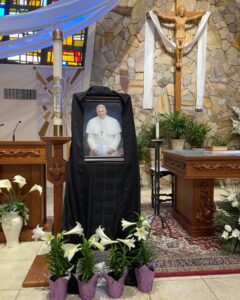
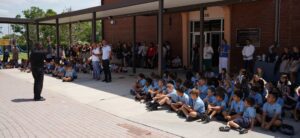
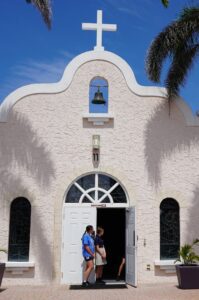
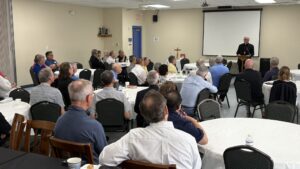
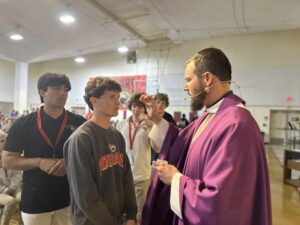
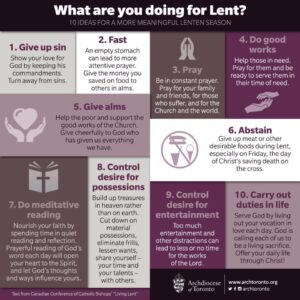 Fasting and abstinence is not just about food, or lack of it, but instead is really about sacrifice for the benefit of our spiritual lives – a fasting from sin. Sacrifice and self-denial should not be viewed as something to lament but instead should be viewed as an opportunity to remove anything that distracts us from Jesus Christ and a reception of grace. Fasting and abstinence are about spiritual conversion and renewal, not solely about meat and no food.
Fasting and abstinence is not just about food, or lack of it, but instead is really about sacrifice for the benefit of our spiritual lives – a fasting from sin. Sacrifice and self-denial should not be viewed as something to lament but instead should be viewed as an opportunity to remove anything that distracts us from Jesus Christ and a reception of grace. Fasting and abstinence are about spiritual conversion and renewal, not solely about meat and no food.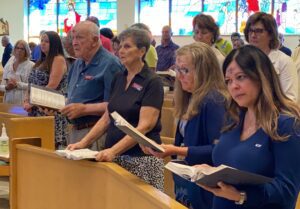
 The third pillar of Lent, almsgiving, is coupled in the Catechism with self-denial. While often mentioned as the last of the three traditional pillars of the Lenten observance, it is certainly not the least of the three and is often completely misunderstood. The Church’s expression of almsgiving is an act of self-denial, or an expression of charity and assistance extended to the needy.
The third pillar of Lent, almsgiving, is coupled in the Catechism with self-denial. While often mentioned as the last of the three traditional pillars of the Lenten observance, it is certainly not the least of the three and is often completely misunderstood. The Church’s expression of almsgiving is an act of self-denial, or an expression of charity and assistance extended to the needy.